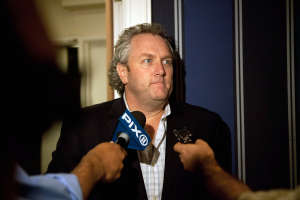
John Hayward
Three great forces shape a society: culture, politics, and economics. Each of them influences the other.
The late Andrew Breitbart famously observed that politics are “downstream” of culture. In other words, culture shapes political expectations. People tend to vote in favor of issues and candidates that enjoy cultural approval. Political commentators often refer to the “Overton window,” which covers the range of “acceptable” positions candidates can hold. If they advocate ideas outside this range, they jeopardize their chances for re-election, because the voters will perceive them as “extremists.”
This window is essentially a cultural phenomenon, because plenty of ideas beyond the Overton window are practically feasible – that is, they are both constitutionally acceptable and achievable. Conversely, sometimes ideas of dubious constitutionality are pushed into the Overton window by ambitious political forces. Accusations of “extremism,” and declarations that “the people” desperately want something, are deliberate cultural efforts to manipulate the window of political possibility.
But politics also shapes culture. One of the most potent examples is the cultural devastation wrought by the Great Society. Over the course of a single generation, the cultural reality of the welfare state’s dependents was profoundly and permanently altered. Dependency and illegitimacy changed the way they viewed the world, which in turn altered their political expectations. A sufficiently powerful government can shape the culture of its people, and it has much to gain by doing so.
Government and culture also interact with economics. Elections are shaped by economic perceptions, an idea captured neatly in the mantra of Bill Clinton’s 1992 election team: “It’s the economy, stupid.”
But the economy is also changed by public perceptions… and politicians are experts at manipulating the way people see things. People spend and invest differently, based on what they believe about the current and future states of the economy. Incumbent politicians often accuse their opponents of causing damage to general prosperity by “talking down” about the economy.
The connection between the economy and culture is obvious. A great deal of popular culture is organized around the worship of “acceptable” wealth, matched with disdain for fortunes that have not been properly “earned.” That’s why the same people who embrace class-warfare themes and fume over “income inequality” will also devour entertainment-media coverage of their favorite celebrity’s opulent lifestyle.
People adjust their cultural expectations based on their financial reality. Those in different income brackets see themselves as living in different worlds. There are good reasons why Hollywood consistently sells rapacious businessmen to the public as villains, even though Hollywood itself is quite the shark tank.
And of course, a prevailing sense of resentment for those who unfairly amass great wealth, by exploiting the Little Guy, leads to political demands for “social justice.” The Left has been very successful at working its political preferences into culture, shaping the battlefield of democracy long before the first vote is cast.
Each leg of this social triangle is, ultimately, a form of communication. That’s obvious enough in the cases of politics and culture, but it’s true of economics as well. Commerce is a flow of data. The value of goods and services, the pathways of investment, supply and demand… these are all transfers of information. This makes it easy for commerce to integrate smoothly with cultural and political communication.
At a primal level, all three forms of communication concern the allocation of resources. Government power allocates resources through compulsive force. Free-market economics shift resources through voluntary transactions. Culture changes the perceived value of goods, particularly human resources. The flow of vast wealth toward a relatively small group of entertainers and athletes, for example, is a cultural transaction; they make all that money because their audiences believe they are worth it. In many other ways, cultural exchanges shape demand, and demand is one of the fundamental economic forces.
It is wise to appreciate this interaction between culture, politics, and the economy when considering any important issue. Before making a decision that will have a profound effect on one aspect of the social triangle, we should remember that it will ultimately affect all of them. Nothing happens in a vacuum. You can’t create a gigantic welfare state without also producing a culture of dependency, and draining the economic vitality that could offer people opportunity instead of dependency. You can’t import powerful cultural and economic forces through large-scale immigration without also changing the electoral map. A weak economy can lead to electoral demands for new government… or it can lead to even greater power for the State, as fearful people demand greater protection from hardship. If they’re already comfortable with central command of the economy, they have every reason to believe politicians when they promise such protection.
It’s a shame that the most malevolent forces seem to best understand this complex three-way relationship, but it’s not really a surprise. Only power-hungry politicians – including big players in the cultural or economic arenas with political aspirations – are likely to view all other elements of society as tools for fulfilling their ambitions. Many citizens want to be left alone, to pursue their dreams and live according to their values. But they won’t be left alone… because the power of government has grown, making the political leg of the triangle much longer than the others. Privacy and liberty demand a far more equilateral configuration.
Addendum: A thought experiment: Is it a reliable indicator of social decay when the legs of the social triangle become too closely blended together? In a healthy society, they influence one another… but remain distinct.
No comments:
Post a Comment